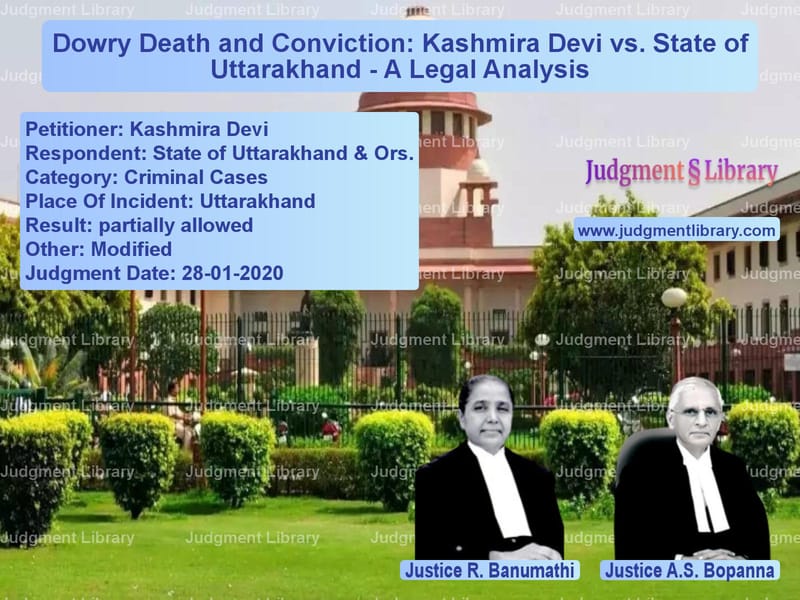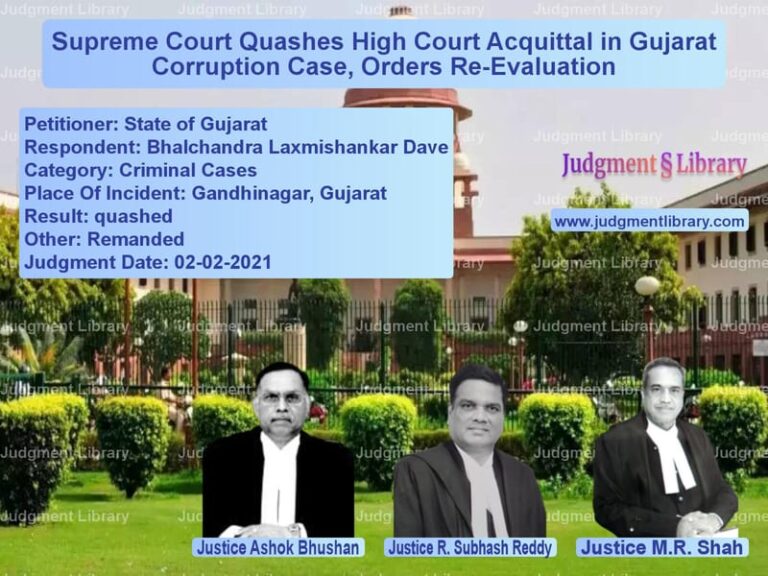Dowry Death and Conviction: Kashmira Devi vs. State of Uttarakhand – A Legal Analysis
The tragic case of Kashmira Devi vs. State of Uttarakhand is a significant example of legal intervention in dowry-related deaths. It highlights the judiciary’s approach to cases under Section 304-B and Section 498-A of the Indian Penal Code (IPC), which deal with dowry death and cruelty to a married woman, respectively. The Supreme Court, in this case, was called upon to determine whether Kashmira Devi, the deceased’s mother-in-law, was responsible for her death and whether the High Court was justified in overturning the trial court’s acquittal.
Background of the Case
The case revolves around Urmila @ Guddi, who was married to Jagdish Singh approximately four years before her death. According to the prosecution, Urmila’s in-laws, including her husband and mother-in-law (the appellant), were dissatisfied with the dowry given at the time of marriage. She was allegedly harassed and subjected to cruelty for not fulfilling additional dowry demands.
On February 8, 2008, Urmila suffered severe burn injuries. Her in-laws claimed that the injuries were due to a stove burst, while the prosecution contended that she was deliberately set on fire by her mother-in-law following a domestic dispute. She succumbed to her injuries on February 14, 2008. The prosecution relied on multiple dying declarations to establish the guilt of the accused.
Trial Court Proceedings
The trial court acquitted the accused, including Kashmira Devi, citing insufficient evidence. The key reasons for acquittal were:
- The presence of three conflicting dying declarations made by the deceased, making them unreliable.
- The lack of eyewitnesses from the marital home of the deceased.
- The absence of any prior complaint regarding dowry harassment before the alleged incident.
- The delay in filing the FIR, which was only registered on February 29, 2008, more than two weeks after Urmila’s death.
High Court Proceedings
The State of Uttarakhand appealed against the acquittal. The High Court analyzed the dying declarations and other evidence and overturned the trial court’s decision. It convicted Kashmira Devi under:
- Section 304-B IPC (Dowry Death): Life imprisonment and a fine of Rs. 10,000.
- Section 498-A IPC (Cruelty to a Woman): No separate sentence awarded due to substantive punishment under Section 304-B.
Arguments of the Appellant (Kashmira Devi)
Kashmira Devi, through her legal counsel, raised the following key arguments:
- The prosecution failed to establish that Urmila’s death was unnatural and linked to dowry harassment.
- No prior complaints about dowry demands were made by Urmila’s parents.
- The FIR was lodged with undue delay, reducing its credibility.
- There were three dying declarations, and the first two supported the defense’s claim of an accidental fire. The High Court wrongly ignored these declarations.
- The High Court improperly reversed the acquittal without any substantive new evidence.
Arguments of the Respondents (State of Uttarakhand)
The prosecution countered the appellant’s claims, arguing:
- Urmila’s dying declaration on February 13, 2008, was recorded in the presence of her parents, and it clearly stated that Kashmira Devi set her on fire.
- The deceased had been subjected to continuous dowry harassment, as confirmed by testimonies of her parents and relatives.
- Under Section 113-B of the Indian Evidence Act, the burden of proof shifts to the accused in dowry death cases, and the defense failed to rebut the presumption.
- Delays in lodging the FIR were justified since the family’s priority was to save Urmila’s life.
- The trial court ignored crucial evidence and relied too heavily on the initial dying declarations recorded under duress.
Key Observations of the Supreme Court
The Supreme Court carefully examined the legal principles governing dowry deaths and the evidentiary value of multiple dying declarations. The Court made the following findings:
- Death Within Seven Years of Marriage: Since Urmila’s death occurred within seven years of marriage, Section 304-B IPC was applicable.
- Dying Declarations: While the first two dying declarations suggested an accidental fire, the third declaration, recorded without any external influence, specifically accused Kashmira Devi of setting her on fire.
- Presumption Under Section 113-B: Once it was established that Urmila had suffered an unnatural death, the burden shifted to the accused to prove their innocence. They failed to do so.
- Credibility of Prosecution Witnesses: The testimonies of Urmila’s mother, father, and uncle were consistent and supported the case of dowry harassment.
Verbatim Court Findings
The Supreme Court noted:
“The prosecution has proved that soon before the death, the deceased was subjected to cruelty and harassment. When prosecution has established that deceased was subjected to dowry harassment and that within seven years of marriage she had died an unnatural death, the presumption under Section 113-B of the Evidence Act is to be raised against the appellant that she caused the dowry death.”
The Court further held:
“If it was a case of false implication, there was no reason for the deceased to have been so specific insofar as the act of causing the death without naming the other members of the family when all of them were involved in the act of demanding dowry.”
Final Judgment
The Supreme Court upheld the conviction of Kashmira Devi under Sections 304-B and 498-A IPC. However, considering her age and family circumstances, it modified the sentence:
- Life imprisonment was reduced to seven years of rigorous imprisonment.
- The fine of Rs. 10,000 was upheld.
- No separate sentence was awarded under Section 498-A IPC.
Final Verdict: Conviction upheld, sentence reduced to seven years of rigorous imprisonment.
Petitioner Name: Kashmira Devi.Respondent Name: State of Uttarakhand & Ors..Judgment By: Justice R. Banumathi, Justice A.S. Bopanna.Place Of Incident: Uttarakhand.Judgment Date: 28-01-2020.
Don’t miss out on the full details! Download the complete judgment in PDF format below and gain valuable insights instantly!
Download Judgment: Kashmira Devi vs State of Uttarakhand Supreme Court of India Judgment Dated 28-01-2020.pdf
Direct Downlaod Judgment: Direct downlaod this Judgment
See all petitions in Dowry Cases
See all petitions in Murder Cases
See all petitions in Suicide Cases
See all petitions in Judgment by R. Banumathi
See all petitions in Judgment by A. S. Bopanna
See all petitions in partially allowed
See all petitions in Modified
See all petitions in supreme court of India judgments January 2020
See all petitions in 2020 judgments
See all posts in Criminal Cases Category
See all allowed petitions in Criminal Cases Category
See all Dismissed petitions in Criminal Cases Category
See all partially allowed petitions in Criminal Cases Category







